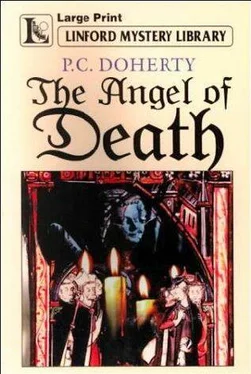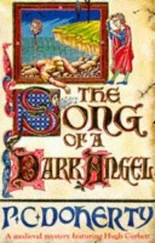Paul Doherty - Angel of Death
Здесь есть возможность читать онлайн «Paul Doherty - Angel of Death» весь текст электронной книги совершенно бесплатно (целиком полную версию без сокращений). В некоторых случаях можно слушать аудио, скачать через торрент в формате fb2 и присутствует краткое содержание. Жанр: Исторический детектив, на английском языке. Описание произведения, (предисловие) а так же отзывы посетителей доступны на портале библиотеки ЛибКат.
- Название:Angel of Death
- Автор:
- Жанр:
- Год:неизвестен
- ISBN:нет данных
- Рейтинг книги:4 / 5. Голосов: 1
-
Избранное:Добавить в избранное
- Отзывы:
-
Ваша оценка:
- 80
- 1
- 2
- 3
- 4
- 5
Angel of Death: краткое содержание, описание и аннотация
Предлагаем к чтению аннотацию, описание, краткое содержание или предисловие (зависит от того, что написал сам автор книги «Angel of Death»). Если вы не нашли необходимую информацию о книге — напишите в комментариях, мы постараемся отыскать её.
Angel of Death — читать онлайн бесплатно полную книгу (весь текст) целиком
Ниже представлен текст книги, разбитый по страницам. Система сохранения места последней прочитанной страницы, позволяет с удобством читать онлайн бесплатно книгу «Angel of Death», без необходимости каждый раз заново искать на чём Вы остановились. Поставьте закладку, и сможете в любой момент перейти на страницу, на которой закончили чтение.
Интервал:
Закладка:
Corbett sat on the top sanctuary step and thought quickly. There were three things wrong with this. First, despite his many distractions during the service, never once had he seen de Montfort falter or stumble. Nothing strange had been noticed during the mass. Surely a man who was being slowly poisoned would complain of pains? But no such thing had happened. Secondly, if this poison was given before mass, it must have been a very slow-acting one. Yet Corbett, in all his experience, had never heard of this. Most poisons were deadly swift. As a clerk in the King's Bench, he had attended the trial of many accused of poisoning; such poisons acted within minutes. Indeed, that was how the culprit was often apprehended: he or she could never leave the place of the crime quickly enough. Thirdly, and here Corbett was glad he knew a little of Canon Law, any priest who was saying mass and receiving the sacrament, could not eat or drink after midnight. It would be ridiculous to think de Montfort had drunk the wine the evening before, the poison not acting until many hours later.
Corbett frowned in concentration, baffled at the mystery. Whoever had planned de Montfort's murder had plotted it carefully. But why here? Why, if someone wanted to kill de Montfort, do it in the open before the eyes of the king, his court, the chief officers of the crown, and most of the leading dignitaries of London? Indeed, the same mystery surrounded any would-be assassin's attempt to kill the king. Why here in St Paul's at the sacrifice of the mass? Corbett rubbed his eyes; he was exhausted, weary of this matter. He got up and walked back down the nave. He heard a sound, a faint scuffling in the transept. Corbett stopped, feeling the panic and fear return. If he went out there, anyone, virtually a whole army, could hide in the darkness. Yet if someone had wanted to kill him they could have struck when he sat in the pool of light in the sanctuary. Was it just a trick of his imagination? Corbett strode quickly on, almost shouting with relief as he opened the door and stepped into the snowy whiteness outside the cathedral.
6
The next morning Corbett was awake long before the bells of the city churches began to toll for prime. It was a grey, misty morning and more snow had fallen during the night. Corbett, who could now afford to have his windows glazed, was glad he had fitted new wooden shutters, a second barrier against the ever piercing wind. His chamber was simple, albeit spacious and the plaster walls were covered with worsted hangings of red, green and blue. A large oaken cupboard kept cups and a collection of plate. There was a table-board over a pair of trestles, a bench, a stool, a heavy carved high-backed chair with arms and scarlet cushion. Corbett had cleared the floor of rushes and straw, those harbourers of dirt and disease, and spent precious gold on a thick heavy Persian carpet, an object of envy to his few visitors. Most of the room was taken up with the broad oak-carved bed, now draped with a dark blue coverlet and surrounded by heavy serge curtains, there not only to maintain privacy but also a protection against the biting cold.
Corbett had already lit the charcoal brazier, ever anxious lest a spark escape and start a fire. He took the same care with a chafing-dish set on a table to heat the room and a silver candelabra which bore four candles, each of which now flickered, giving off some meagre warmth and light. From beneath the bed Corbett pulled an iron-studded trunk and, undoing the locks, pulled out his warmest shirts, robes, leggings and a stout pair of walking boots. He also took out a belt he had owned since the Welsh wars and, pulling out another trunk, slipped a long wicked Welsh dagger and a thin rapier into two sheaths. He crossed to the laver stand holding a basin and towels and washed his face and hands, quietly cursing the cold. Once finished, he secured the trunk, pushing it back under the bed, extinguished the fire and lights and, looking once more around his chamber, left, going up a further flight of stairs to a small room beneath the roof where Ranulf slept.
His servant's garret was totally disordered and Corbett grinned mirthlessly. He remembered the previous night, tramping round most of St Paul's looking for his servant, only to find him drunk as a stoat in one of the outer kitchens. Ranulf had gorged himself on the leavings of the feast and drunk flagon after flagon of wine, openly boasting about his own greatness and the silver he might give to a pretty kitchen maid he was inveigling into spending the night with him. Cursing and yelling he had been dragged by Corbett out into the cold, along the dark narrow alleyways back to Bread Street. Ranulf had threatened his master, accusing him of being a summoner and refusing him any pleasures. Corbett had dragged him along, brutally ignoring his protestations. Only twice did he stop: once to allow Ranulf to be sick; the other to douse him in a horse trough. The icy-cold water had helped to bring Ranulf to his senses, though by the time they had reached Bread Street, Ranulf had fallen into a stupor and his master had to drag him up the stairs and toss him onto his trestle bed.
Corbett had warned him time and again not to drink to excess and to watch his tongue. Now he would emphasize the lesson. He picked up an ewer of ice-cold water and poured it slowly over Ranulf s tousled head. The servant woke gasping, spluttering, cursing and, if it had not been for the look in Corbett's eyes, Ranulf would certainly have struck the clerk full in the face.
'You are, Master Clerk,' he rasped through clenched teeth, 'a most cruel man.'
'And you Master Ranulf,' Corbett jibed in reply, 'are a most stupid man. I have ordered you on a number of occasions, whenever we are on the king's business to watch what you drink, because if your tongue wags when it shouldn't, it may well cost us our lives, not to mention being arrested by Serjeants of the king's court on some charge of treason!'
Corbett jerked Ranulf roughly out of bed. The fellow was still fully dressed except for his boots, and Corbett made his servant sit on the edge of the bed and threw them at him.
'Put them on!' he ordered. 'Go downstairs. Relieve yourself in the street. Your stomach must be a cesspit now. I will not have you stinking the house out with your stale humours.'
Ranulf pulled on his boots, glared at the dark, tense face of his master and the narrow green cat-like eyes, and decided that revenge could wait. He would bide his timeand wait for his ever-sombre master to become maudlin-drunk in some tavern and serve back the same medicine. Ranulf clattered downstairs.
A little later, rather pleased he had followed Corbett's advice, Ranulf returned; but his master had not yet finished. He ordered Ranulf back up to his room to strip and wash and put on a fresh change of clothing. Only then, when both of them were dressed in woollen hose, long high boots, surcoat and hood, did they venture downstairs into the street.
Corbett had decided not to take their horses, stabled at a tavern further down Bread Street. Instead they would walk, for in some places the snow was knee-deep. The whole city looked as if it was under a carpet of white damask; underfoot the snow was frozen hard, while the ice, in huge jagged icicles, hung like tear-drops from the intricate gabled tiers of the houses. They turned into Cheapside. The busy thoroughfare, usually filled with stalls and shops, was deserted. The huge-framed merchant houses, built of strong thick oak and folded in with plaster three to four stories high, were all shuttered and covered in white except for those which bore the arms of the city shields of bright vermilion with a figure of St Paul in gold, the head, arms and feet of the saint in silver. The snow had slipped off these shields, making them blaze all the more fiercely against the whiteness. A friar, ghost-like, hurried by; his white robe would have made him blend with the snow but for the exquisite cope he wore round his shoulders which concealed the viaticum he carried to some sick person. Two tired boys, desperately attempting to keep their candles alight, preceded him.
Читать дальшеИнтервал:
Закладка:
Похожие книги на «Angel of Death»
Представляем Вашему вниманию похожие книги на «Angel of Death» списком для выбора. Мы отобрали схожую по названию и смыслу литературу в надежде предоставить читателям больше вариантов отыскать новые, интересные, ещё непрочитанные произведения.
Обсуждение, отзывы о книге «Angel of Death» и просто собственные мнения читателей. Оставьте ваши комментарии, напишите, что Вы думаете о произведении, его смысле или главных героях. Укажите что конкретно понравилось, а что нет, и почему Вы так считаете.












